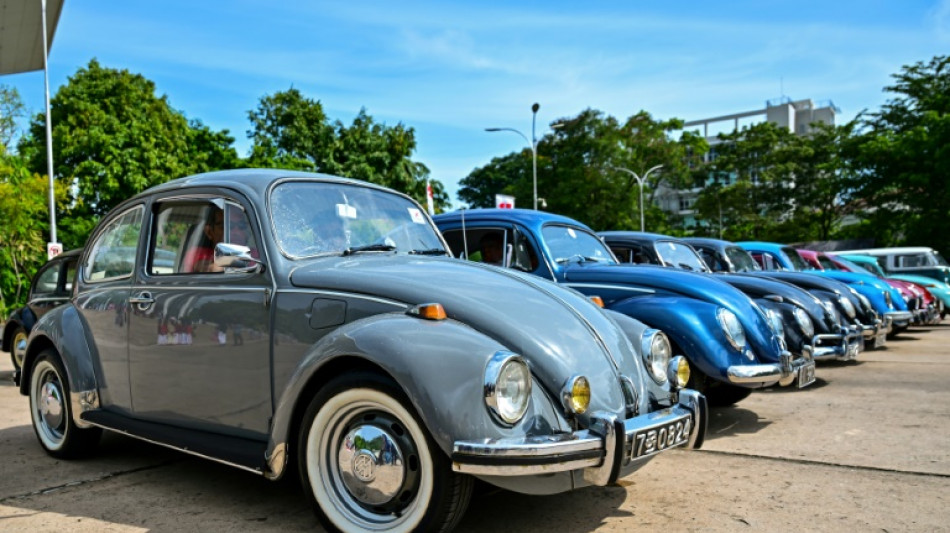
-
 Rampant South Africa inflict record 43-10 defeat on All Blacks
Rampant South Africa inflict record 43-10 defeat on All Blacks
-
Collignon stuns De Minaur as Belgium take 2-0 Davis Cup lead over Australia

-
 Mourning Nepalis hope protest deaths will bring change
Mourning Nepalis hope protest deaths will bring change
-
Carreras boots Argentina to nervy 28-26 win over Australia

-
 Nepal returns to calm as first woman PM takes charge
Nepal returns to calm as first woman PM takes charge
-
How mowing less lets flowers bloom along Austria's 'Green Belt'

-
 Too hot to study, say Italian teachers as school (finally) resumes
Too hot to study, say Italian teachers as school (finally) resumes
-
Alvarez, Crawford both scale 167.5 pounds for blockbuster bout

-
 Tokyo fans savour athletics worlds four years after Olympic lockout
Tokyo fans savour athletics worlds four years after Olympic lockout
-
Akram tells Pakistan, India to forget noise and 'enjoy' Asia Cup clash

-
 Kicillof, the Argentine governor on a mission to stop Milei
Kicillof, the Argentine governor on a mission to stop Milei
-
Something to get your teeth into: 'Jaws' exhibit marks 50 years

-
 Germany, France, Argentina, Austria on brink of Davis Cup finals
Germany, France, Argentina, Austria on brink of Davis Cup finals
-
War with Russia weighs heavily on Ukrainian medal hope Doroshchuk

-
 Suspect in Charlie Kirk killing caught, widow vows to carry on fight
Suspect in Charlie Kirk killing caught, widow vows to carry on fight
-
Dunfee and Perez claim opening world golds in Tokyo

-
 Ben Griffin leads PGA Procore Championship in Ryder Cup tune-up
Ben Griffin leads PGA Procore Championship in Ryder Cup tune-up
-
'We're more than our pain': Miss Palestine to compete on global stage

-
 Ingebrigtsen seeks elusive 1500m world gold after injury-plagued season
Ingebrigtsen seeks elusive 1500m world gold after injury-plagued season
-
Thailand's Chanettee leads by two at LPGA Queen City event

-
 Dolphins' Hill says focus is on football amid domestic violence allegations
Dolphins' Hill says focus is on football amid domestic violence allegations
-
Nigerian chef aims for rice hotpot record

-
 What next for Brazil after Bolsonaro's conviction?
What next for Brazil after Bolsonaro's conviction?
-
Fitch downgrades France's credit rating in new debt battle blow
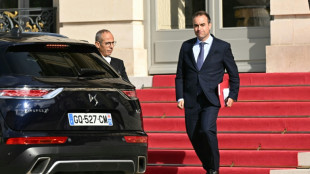
-
 Fifty reported dead in Gaza as Israel steps up attacks on main city
Fifty reported dead in Gaza as Israel steps up attacks on main city
-
Greenwood among scorers as Marseille cruise to four-goal victory

-
 Rodgers calls out 'cowardly' leak amid Celtic civil war
Rodgers calls out 'cowardly' leak amid Celtic civil war
-
Frenchman Fourmaux grabs Chile lead as Tanak breaks down

-
 Germany, France, Argentina and Austria on brink of Davis Cup finals
Germany, France, Argentina and Austria on brink of Davis Cup finals
-
New coach sees nine-man Leverkusen beat Frankfurt

-
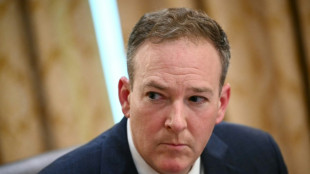 US moves to scrap emissions reporting by polluters
US moves to scrap emissions reporting by polluters
-
Matsuyama leads Ryder Cup trio at PGA Championship

-
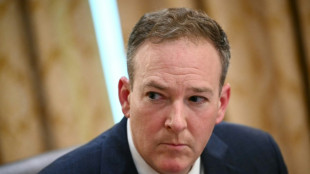 US to stop collecting emissions data from polluters
US to stop collecting emissions data from polluters
-
Pope Leo thanks Lampedusans for welcoming migrants

-
 Moscow says Ukraine peace talks frozen as NATO bolsters defences
Moscow says Ukraine peace talks frozen as NATO bolsters defences
-
Salt's rapid ton powers England to record 304-2 against South Africa in 2nd T20

-
 Noah Lyles: from timid school student to track's showman
Noah Lyles: from timid school student to track's showman
-
Boeing defense workers reject deal to end strike
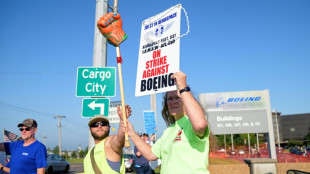
-
 Germany, Argentina close in on Davis Cup finals
Germany, Argentina close in on Davis Cup finals
-
Alvarez, Crawford both tip scales at 167.5 pounds for title bout

-
 Armani will lays path to potential buyout by rival
Armani will lays path to potential buyout by rival
-
'We don't want to become a memory': minister of endangered Tuvalu

-
 Ireland coach 'fully confident' Wafer fit for Women's Rugby World Cup quarter-final
Ireland coach 'fully confident' Wafer fit for Women's Rugby World Cup quarter-final
-
Philipsen wins sprint for Vuelta treble

-
 Nepal ex-chief justice Karki becomes next PM after protests
Nepal ex-chief justice Karki becomes next PM after protests
-
Peruvians live in fear as extortion runs rampant

-
 Philipsen wins Vuelta stage 19 for treble
Philipsen wins Vuelta stage 19 for treble
-
UN expert urges protection for indigenous Botswana people

-
 Costa Rica arrests four in murder of Nicaraguan exile
Costa Rica arrests four in murder of Nicaraguan exile
-
Moscow says peace talks frozen as Zelensky warns Putin wants all of Ukraine


Europe's carmakers still nervous despite EU-US trade deal
Europe's auto industry is relieved that the EU-US trade deal reduces short-term uncertainty but many, particularly in the struggling German sector, remain deeply worried about the long-term impact.
After months of tariff turbulence that threatened to escalate into a trade war, US President Donald Trump and EU chief Ursula von der Leyen struck the agreement Sunday that will see EU exports taxed at 15 percent.
This across-the-board rate also applies to exports from Europe's critical auto sector to America, and is far below a previous rate of 27.5 percent for cars and vehicle parts that came into force in April.
European auto industry group ACEA welcomed the "de-escalation" as the United States is a major destination for the continent's vehicle shipments, accounting for 22 percent of the EU export market in 2024.
It is an "important step towards easing the intense uncertainty surrounding transatlantic trade relations in recent months," the group said.
French automotive supplier Forvia echoed the message, saying the accord "helps reduce volatility and uncertainty... for all economic players".
There was still a great deal of concern -- the tariffs remain far higher than a 2.5 percent rate that European manufacturers exporting to the United States faced before Trump returned as president.
The 15-percent levy "will continue to have a negative impact not just for industry in the EU but also in the US," said ACEA director general Sigrid de Vries.
- German industry woes -
The German auto sector stands to be hit particularly hard, with the United States the top market for German vehicle exports last year, receiving about 13 percent of the total.
The 15-percent tariff "will cost German automotive companies billions annually and burdens them", said Hildegard Mueller, president of Germany's main auto industry group, the VDA.
This comes at a time when top German carmakers Volkswagen, BMW and Mercedes-Benz were already struggling with falling sales in China, weak demand in Europe and a slower than expected transition to electric vehicles.
The impacts of the higher rates introduced earlier this year are already being felt.
Volkswagen, Europe's biggest automaker, reported a 1.3 billion euro hit for the first half of the year due to the tariffs.
Stellantis, whose brands include Jeep, Citroen and Fiat, has seen North American vehicles sales plummet, and Swedish automaker Volvo's earnings were hit by tariffs.
Some industry leaders have proposed solutions.
BMW's chief Oliver Zipse suggested in June that Europe should drop its import tariffs on cars imported from the United States.
Volkswagen boss Oliver Blume has said the group could forge its own agreement with Washington that took into account the investments the group plans in the United States, the world's biggest economy.
But for now there is little relief on the horizon, and carmakers will have to adapt.
In the long term, higher tariffs in the United States than in Europe could create "big losers" in Germany's automotive industry, said Ferdinand Dudenhoeffer, director of the Center Automotive Research institute.
If BMW and Mercedes boost production in the United States to skirt tariffs, they could start shipping a growing number of vehicles to Europe that are subject to lower import levies, Dudenhoeffer said.
Struggling auto plants in Europe "will reduce their production", he warned, which could lead to up to 70,000 jobs being cut in Germany and shifted to America.
R.Kloeti--VB

